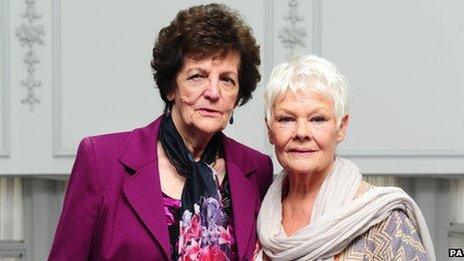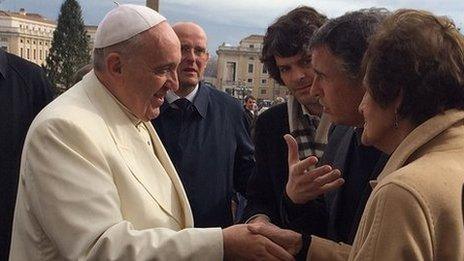Philomena Lee in Irish adoption law change call
- Published
Philomena Lee is supporting a campaign to give greater access to adoption files in Ireland
The story of Philomena Lee's life has done more than inspire an award-winning film - it has encouraged other Irish women to search for children that were taken away from them.
The Adoption Authority, external in the Republic of Ireland says there has been a significant increase in the number of people attempting to trace members of their family.
But many are finding that to be a frustrating process because people are not entitled to see their adoption records in Ireland.
Now a campaign called the Philomena Project, external has been set up to try to change the law in order to give greater access to those files.
'Mortal sin'
The appeal has the support of Philomena Lee herself, who was one of thousands of women forced to give up their children during the 1950s and 1960s in Ireland.
"We firmly believed we had committed a mortal sin by having a baby out of wedlock," she says.
"Times are different today, thank goodness.
"We were just led to believe we were sinners and that was it."

Dame Judi Dench (right) played Philomena Lee on screen
Philomena was disowned by her father when she became pregnant and she was taken into what was known as a mother and baby home, run by the Catholic Church.
When her son Anthony was three-and-a-half years old, the nuns in the convent gave him up for adoption to an American couple.
"I did lose my faith at that stage," she admits.
"Some of it - not all of it of course - because I continued praying for him and hoping that one day I would find him."
She never did see her son again. He grew up on the other side of the Atlantic as Michael Hess and died when he was just 43 years old of Aids.
However, she delights in telling me about meeting his friends in recent months and what she has learned of his life.
Now she hopes that as a result of her campaigning some mothers will have a chance to be reunited with their 'forcibly adopted' children.
"I thought everywhere was like the UK; that at the age of 18 there were open adoption records," said Jane Libberton, Philomena's daughter who helped in the search for Anthony.
"Obviously I discovered that was not the case, which is one of the reasons we started the Philomena Project."

Pope Francis met Philomena Lee (right) and Steve Coogan (second right)
That campaign is being spearheaded by the Adoption Rights Alliance, external, which gives advice on how to search for relatives.
The organisation says it has seen many elderly women contact it in recent months, and they believe that is because of what they are calling the Philomena effect.
"Philomena Lee has been fantastic," said Susan Lohan, one of the founders of the Alliance.
"She's appealing directly particularly to those older women to get rid of that shame and guilt.
"And she's pointing out that shame and guilt is not with them... it is with Irish society, it is with the Irish state and it is with the Catholic Church in Ireland."
However, Philomena Lee herself is again putting her faith in the church.
As part of her efforts to open up adoption files in Ireland, she met the Pope earlier this month.
She believes he listened to what she had to say and describes him as "a lovely pope".
He is not the only one she has been trying to influence in recent months.
She talks of meeting mayors and movie stars, and tells stories of US talk shows and awards ceremonies.
Yet, despite having her life immortalised on screen by Dame Judi Dench, there is a part of Philomena that seems to wonder why she has been at the centre of so much fuss.
"I don't know about the Philomena effect really," she says with a smile.
"I am just me. I am no different to what I used to be."
- Published17 February 2014
- Published17 February 2014
- Published6 February 2014
- Published25 January 2014